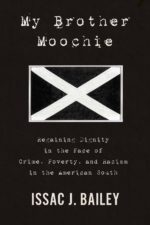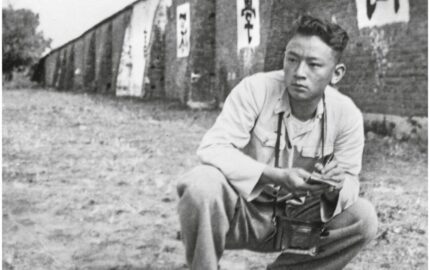I didn’t know it at the time, but my career in journalism began in St. Stephen, South Carolina when I was a 9-year-old boy—the year my hero big brother murdered a man and briefly faced the death penalty. That night in April 1982 has haunted and fascinated me and shaped my views of race, justice, poverty, empathy—and truth. It’s why I cringed while standing in the newsroom overhearing fellow journalists giggling when a member of a perpetrator’s family claimed her loved one, accused of a dastardly crime, was actually “a good person.” My experience as a journalist allowed me to understand the giggle, borne of a healthy skepticism that is a bedrock of great journalism. My experience as the younger brother of a man who committed murder allowed me to empathize with even the worst offenders, to remember to acknowledge their humanity even while never excusing their crimes. Those experiences were often in tension, no more so than when I set out to uncover the truth about what my brother did the night that James Bunch died, a path that eventually led to my sitting across from a member of the murdered man’s family. In that moment, was I just a veteran journalist? Or an emotionally-broken little brother? I was both, a story I tell in “My Brother Moochie: Regaining Dignity in the Face of Crime, Poverty, and Racism in the American South,” published today by Other Press. Before that encounter occurred, there was research and interviews I needed to conduct.
An edited excerpt:
Moochie was not found guilty in a court of law after a lengthy, fair trial, where we could have assessed the veracity of the evidence. He pled guilty. It may have spared the victim’s family a greater emotional burden and the state and county a few taxpayer dollars. But it robbed my family of a reckoning with truth. It did nothing to answer our questions, only fueled our doubts. It felt like a rush to steal him from us as quickly and clinically as possible and to hurt him and us as much as possible. Research shows that poor black men are among the most likely to plead guilty, whether guilty or innocent. Those who plead guilty, even if they are innocent, are less likely to be exonerated later and more likely to have a harder time trying to reenter the world after serving their prison sentences—because when they confessed, they erased all legal doubt.
“When the judge said ‘Life,’ I saw something go out of Moochie,” Mama said. “A piece of him died. A piece of me died, too.”

I held out hope that maybe Moochie was innocent well into my thirties. Then I went looking for answers. I told myself I would remove my brother hat and put on my journalistic one, that I’d be okay with whatever I found. I pretended to not care about wanting to prove he really didn’t do it. In my most honest, or weak, moments, I imagined bringing the Bailey and Bunch families together in a kind of Hollywood ending—hugs and kisses, shared tears of reconciliation— that would bring relief to my long-suffering mother and begin healing our forever-fractured clan.
I want to tell that story. I can’t. The facts won’t allow me to. Everywhere I turned, digging through old court documents, sitting down with detectives, speaking to family members who were old enough to process what happened, the truth became clearer, that my hero big brother had, indeed, killed Mr. Bunch.
Sherrie found Moochie’s bloody clothes, hidden under our house, after he had been sentenced. Doug remembered Moochie telling us that Moochie had tried to rob Mr. Bunch, got into a tussle, and stabbed him “over and over and over again.”
“I remember him saying forty-one times,” he said. “Moochie wasn’t violent. I know that is weird to say. I don’t think he was lucid when he did these things. Some drugs affect you in strange ways. Mom and Dad went through some things that he may have witnessed when he was young, but I’m telling you, Moochie was a well-adjusted, well-loved, personable, smart person. He did a lot of bad things, but he always looked out for his family.”
My big brother was a murderer, or at least a man who committed murder. Not even an overactive imagination could keep me from facing that reality any longer. With that, my dream of rushing home to tell Mama I could prove Moochie’s innocence, could help him get out of prison like the Innocence Project had been doing, died, with no third-day resurrection.
I told myself I would remove my brother hat and put on my journalistic one, that I’d be okay with whatever I found
That revelation came twenty-three years after Daddy died of heart failure, just two years into Moochie’s prison sentence. Daddy had not needed to overcome a quarter of a century of contemplation and denial before believing his oldest son had committed murder. Daddy visited Moochie at the Berkeley County jailhouse not too long after Moochie had been arrested for Mr. Bunch’s murder. He had been living away from us for at least a year by then.
“‘I did all I could do with that boy, all I could do,’” Sherrie remembers Daddy saying as he left the jail, never to visit it or Moochie again. “It was the only time I saw Daddy cry.”
Lindsey Street, a reporter for the Berkeley Independent, the local weekly newspaper whose coverage area included St. Stephen and Bonneau, revisited the issue more than thirty years after the murder. Her findings were similar to mine. Moochie was immediately identified as a suspect, given he was arrested for robbing Mr. Bunch the week before, Street found.
The friend who drove Moochie from St. Stephen to Bonneau thought he was taking Moochie to a girl’s house or to pick up drugs. Moochie left the car and entered the Bunch house through a window. He confronted Mr. Bunch, trying to get him to drop the robbery charge. Mr. Bunch said no, a fight ensued, and Moochie began stabbing Mr. Bunch, Street wrote.
“Bunch staggered out of the house and into the yard. A fire started inside Bunch’s house. Bailey would tell law enforcement the next day that he lit the fire to erase the stabbing evidence, but his cellmate reported Bailey saying several months later that the fire was an accident of a lamp falling over in the scrap,” Street reported.
Mr. Bunch was dead by the time emergency officials got him to Trident Regional Hospital at 11:00 p.m.
A young South Carolina Law Enforcement Division agent, Chad Caldwell, arrived at the scene of the murder. “It was a brutal crime. Any time anybody gets stabbed, there’s a lot of blood, and you know that the victim suffered,” Caldwell said. He wrote in his 1982 report of the scene there was “a considerable amount of blood” and it was splattered five feet up on the walls. Bailey was picked up by authorities hours after the incident. Caldwell and a Berkeley County Sheriff’s deputy interviewed Bailey. “I could see he had remorse. He did regret doing it.”
“With prosecutors seeking the death penalty, Bailey pleaded guilty Jan. 12, 1983,” Street wrote. “Judge Lee Chandler sentenced him to life with the possibility of parole.”
By the time of Street’s account, I had spent several years reporting on violence and criminal justice, getting an up-close look at how crime ripped apart families the way it had mine. More importantly, the last bit of doubt I had about Moochie’s guilt had already been put to rest, not only by what I had found, but by Moochie himself.
For a quarter of a century, Moochie never opened up about the crime. And there was no sit-down between the Baileys and the Bunches, no contrite Moochie explaining to the family of the man he stabbed to death why and how he did what he did. Our families were forever linked on the night of April 27, 1982, but have been walking divergent paths since.
That happened, in part, because there was no practical way to do it any differently at the time. The justice system has since been experimenting with ways to bring victims and convicts together to provide each a greater level of understanding, maybe even reconciliation. In St. Stephen and Bonneau in 1982, it was more likely that rumors of the Ku Klux Klan retaliating against my family for Moochie’s crime would be true, or that a young prosecutor would be eager to send him to death row, than the possibility of the Bunches and the Baileys getting together to mitigate the harm done by Moochie’s knife. In those early years, Moochie further complicated things by denying his guilt. After I had seen a psychiatrist to deal with my PTSD and she recommended I explore the crime in depth, and I had begun sharing our painful family history with readers, I got a call from Moochie. I missed it while bathing my young kids. An automated voice from the S.C. Department of Corrections imprinted itself on my answering machine. He called back maybe a half hour later.
During the first of two fifteen-minute conversations (South Carolina limited calls from prison to that time-frame), I sat mostly quiet as Moochie asked about family members and told me how he was getting his privileges back eighteen months after being a less than perfect prisoner. The next call was different. His voice dripped with shame as he spoke words that were void of their usual bass and buoyancy, the rare time I had ever heard him sound like a little boy. I couldn’t see him but imagined him fidgeting in his seat on the other end of the phone and lowering his volume and cupping his hand over the receiver so those around him couldn’t hear what he was saying.
He spoke cautiously, hesitantly, but clearly as I relentlessly asked questions. Too many young black men grow up in poverty and face racism—something I’d heard him preach for years—but that can’t be used as an excuse, something he had seldom admitted.
I hated that the system remained unfair and that it had corralled too many young black men who had grown up with poverty and domestic violence, like Moochie
He robbed Mr. Bunch a couple of days before the murder, Moochie told me. A friend whispered in his ear that he needed to “take care of Mr. Bunch” if he didn’t want to go back to jail. He had been drinking and drugging and wasn’t in his right mind, allowing that simple suggestion to take root. A different friend drove him near Mr. Bunch’s store. He got out, ran to the store, killed Mr. Bunch, ran back to the car. He changed clothes at our house and went to Dreamland, a juke joint where locals drank, smoked, and danced, and threw away the knife somewhere along the way. He had no diabolical plan to avoid detection; he was simply reacting to the first thought in his mind.
For so many years, he did not understand why we wanted him to show remorse, to admit what happened. We wanted closure and clarity for our own sanity. We wanted him to help us lay rumors to rest, wanted to be able to grieve. We wanted him to seek forgiveness, if not from the Bunch family and correctional officials, then from God, and himself.
Our denial of Moochie’s guilt was built upon gaps in our knowledge of the night Mr. Bunch was killed, his on the truth he knew better than anyone.
“I get it, now,” Moochie said of why it was important to fully own up to and face the worst act he had ever committed. “I get it. That’s what happens when you grow up.”
I had already given Mama my assessment of what I found about the murder. I hated that South Carolina had no law that demanded the preservation of evidence in murder cases, hated that the police had convinced Moochie to speak without a lawyer present. I hated that the state’s prison system, like that of the country’s overall, had grown so large between the time of Mr. Bunch’s murder and when I got that phone call from Moochie.
I hated that the system remained unfair and that it had corralled too many young black men who had grown up with poverty and domestic violence, like Moochie, I told Mama.
I hated that I could not tell her the one thing she wanted to hear.
“Mama, he told me he did it,” I told her.
She half-heartedly questioned me about the conversation I had with Moochie and again about what I had found after a months-long journalistic search but didn’t seem to want to really know more. Tears didn’t make their way down our cheeks. Neither of us screamed. We wouldn’t talk about it again for years.
Talking, for me, about anything, had long been a struggle before that day. The longer Moochie stayed in prison, the worse that struggle became.
Issac J. Bailey is the author of the memoir “MY BROTHER MOOCHIE: Regaining Dignity in the Face of Crime, Poverty, and Racism in the American South” (Other Press)


